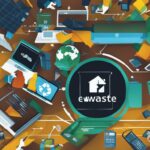Building an Ethical IT Recycling Business
In today’s digital age, electronic waste, or e-waste, has become a global concern due to the improper disposal of electronic devices. The demand for ethical e-waste recycling services is on the rise as more individuals and businesses recognize the importance of responsible waste management. To start an ethical IT recycling business, there are nine essential steps to follow, including conducting industry research, developing a comprehensive business plan, securing funding, and establishing partnerships.
Key Takeaways
- Ethical IT Recycling Business is crucial for responsible waste management.
- Industry research and a comprehensive business plan are essential steps to follow.
- Secure funding and establish partnerships to ensure business growth and success.
- E-waste recycling services play a vital role in promoting sustainability and green technology.
- Proper disposal of electronic devices is necessary to prevent environmental hazards.
The Growing Need for Ethical E-Waste Recycling
The improper disposal of electronic waste, or e-waste, has become a global concern in today’s digital age. The United Nations Global E-waste Monitor reported that a staggering 53.6 million metric tonnes of e-waste were generated globally in 2019, with only 17.4% being officially documented and recycled. This alarming statistic highlights the urgent need for efficient and ethical e-waste recycling practices.
Electronic waste contains toxic additives and hazardous substances that can pose significant environmental and health hazards if not managed properly. The responsible management of e-waste is crucial to mitigate these risks and protect our planet. As a result, the demand for ethical e-waste recycling services is increasing as more individuals and businesses recognize the importance of responsible waste management.
“Responsible E-Waste Management is not just about recycling; it is about safeguarding our environment and ensuring a sustainable future for generations to come.”
Increasing awareness and regulatory pressures are key drivers behind the growing need for ethical e-waste recycling. Governments and environmental organizations have been implementing stricter regulations to reduce the negative impact of e-waste on the environment. Additionally, eco-conscious consumers are actively seeking out businesses that prioritize sustainability and responsible waste management.
By adopting ethical e-waste recycling practices, businesses can not only meet regulatory requirements but also contribute to a cleaner and healthier environment. It is essential for businesses to recognize the growing need for ethical e-waste recycling and take proactive steps to implement responsible waste management strategies.
Electronic Waste Recycling Infographic
Here is an infographic highlighting the environmental hazards associated with improper e-waste disposal:
| Environmental Hazards of Improper E-Waste Disposal | Impact |
|---|---|
| Soil Contamination | Heavy metals and toxic substances from e-waste can leach into the soil, affecting plant growth and contaminating food sources. |
| Water Pollution | E-waste improperly dumped or incinerated can release harmful chemicals into water sources, polluting rivers, lakes, and oceans. |
| Air Pollution | Burning e-waste releases toxic fumes into the air, contributing to air pollution and respiratory problems. |
| Health Risks | Exposure to hazardous substances in e-waste can lead to serious health problems, including damage to the nervous system, kidneys, and reproductive organs. |
It is evident that responsible e-waste management is crucial to safeguard our environment and protect human health. Ethical e-waste recycling practices are not just a responsibility but a necessity in our journey towards a sustainable future.
Researching the E-Waste Recycling Industry and Market Trends
Before starting an ethical e-waste recycling business, thorough research on the industry and market trends is crucial. By gaining a deep understanding of the E-Waste Recycling Industry, you can identify key players, understand regulatory requirements, analyze market demand, and assess the competitive landscape. This research will provide valuable insights into pricing models, customer preferences, and growth opportunities.
To effectively research the E-Waste Recycling Industry and Market Trends, consider the following steps:
- Identify Key Players: Research and analyze the existing players in the industry. Determine their market share, strengths, weaknesses, and unique selling points. This analysis will help you understand the competitive landscape and identify areas where you can differentiate your business.
- Understand Regulatory Requirements: Familiarize yourself with the regulatory requirements and compliance standards related to e-waste recycling. This includes understanding local, regional, and national regulations governing the collection, handling, and disposal of electronic waste. Ensure that your business meets all the necessary legal and environmental obligations.
- Analyze Market Demand: Assess the current and future demand for e-waste recycling services in your target market. Consider factors such as population size, technological advancements, consumer awareness, and government initiatives. This analysis will help you gauge the potential growth and profitability of your business.
- Assess the Competitive Landscape: Analyze your competitors’ strengths, weaknesses, and market positioning. Identify gaps in their offerings and areas where you can provide unique value propositions. This analysis will inform your business strategy and help you position your ethical e-waste recycling business effectively.
E-Waste Recycling Industry Associations
Joining industry associations can provide valuable networking opportunities and access to industry knowledge. Consider becoming a member of the following E-Waste Recycling Industry Associations:
- Association of Electronic Waste Recyclers (AEWR)
- International Electronics Recycling Association (IERA)
- Electronic Recycling Association (ERA)
Attending relevant conferences and trade shows is another effective way to stay updated on the latest industry trends and connect with key stakeholders. Networking with industry professionals, attending educational sessions, and participating in panel discussions can further enhance your understanding of the E-Waste Recycling Industry.
| Conference/Trade Show | Date | Location |
|---|---|---|
| E-Waste World Conference & Expo | October 20-22, 2021 | Frankfurt, Germany |
| Electronics & Cars Recycling Conference | November 17-19, 2021 | Macau, China |
| International Electronics Recycling Congress | January 18-21, 2022 | Salzburg, Austria |
Conducting a SWOT analysis (Strengths, Weaknesses, Opportunities, Threats) specific to the E-Waste Recycling Industry will further enhance your understanding of the market and help you identify areas where your business can excel. By obtaining in-depth knowledge of the industry and market trends, you can make informed decisions and develop a competitive edge in the ethical e-waste recycling sector.
Developing a Comprehensive Business Plan
A comprehensive business plan is a crucial step in establishing a successful and ethical e-waste recycling business. It serves as a roadmap for achieving goals, outlining strategies, and identifying the target market. A well-developed business plan provides clarity and direction, guiding entrepreneurs through the process of starting and growing their business.
When creating a comprehensive business plan, it is essential to clearly define the goals of the ethical e-waste recycling business. These goals should be specific, measurable, attainable, relevant, and time-bound (SMART). By setting clear objectives, entrepreneurs can outline the strategies and actions necessary to achieve them. Common goals for an ethical e-waste recycling business may include minimizing electronic waste, promoting responsible waste management, and providing environmentally friendly recycling solutions.
Furthermore, the business plan should include a thorough analysis of the target market. This involves identifying the ideal customer profile, understanding their needs and preferences, and analyzing the competitive landscape. By conducting market research, entrepreneurs can gain valuable insights into the demand for e-waste recycling services, identify any gaps or opportunities, and develop strategies to effectively reach and serve their target market.
Additionally, the business plan should outline the financial aspects of the ethical e-waste recycling business. This includes determining the startup costs, projecting future revenue, and developing a pricing strategy. By conducting a financial analysis, entrepreneurs can assess the financial viability of their business and attract investors or secure funding.
| Components of a Comprehensive Business Plan | Description |
|---|---|
| Executive Summary | A brief overview of the business, its goals, and strategies. |
| Company Overview | Background information about the business, its mission, and values. |
| Market Analysis | An assessment of the target market, industry trends, and competition. |
| Products and Services | A detailed description of the e-waste recycling services offered. |
| Marketing and Sales Strategy | Strategies for promoting and selling the business’s services. |
| Operations and Management | Information about the business’s organizational structure and team. |
| Financial Projections | Projected revenue, costs, and profitability of the business. |
| Risk Analysis | An assessment of potential risks and mitigation strategies. |
| Implementation Plan | A roadmap for executing the strategies outlined in the business plan. |
Developing a comprehensive business plan is a critical step in building an ethical e-waste recycling business. It provides entrepreneurs with a clear roadmap for success, outlining goals, strategies, target markets, and financial projections. By creating a well-researched and detailed business plan, entrepreneurs can increase their chances of attracting investors, securing funding, and effectively navigating the competitive landscape of the e-waste recycling industry.
Creating a Financial Model
When starting an ethical e-waste recycling business, it is essential to develop a comprehensive financial model that factors in startup costs, pricing strategy, and projected revenue. Conducting thorough research is crucial to identify all the expenses involved in setting up the business, such as acquiring equipment, obtaining necessary permits and certifications, and establishing a suitable facility.
Once the startup costs have been determined, it is important to establish a pricing strategy that takes into account market demand, operational costs, and competitor pricing. Conducting a detailed analysis of the market and understanding the pricing dynamics will enable you to set competitive prices for your services while ensuring profitability.
Projected revenue is a critical component of the financial model as it helps assess the financial viability of the business. Consideration should be given to different revenue streams, such as recycling fees, resale of valuable components, and potential partnerships with manufacturers or other organizations. Calculating realistic revenue forecasts based on market trends and growth projections will provide a solid foundation for financial planning and decision-making.
| Startup Costs | Pricing Strategy | Projected Revenue | |
|---|---|---|---|
| Description | Includes expenses for acquiring equipment, permits, facility setup, etc. | Determining competitive prices based on market demand and costs | Calculating revenue forecasts based on market trends and growth projections |
| Amount | £X | Varies | £Y |
| Source | Self-funding, loans, grants, investors | Market research and analysis | Projected market demand and growth opportunities |
Exploring funding options is also crucial to ensure the financial stability of your ethical e-waste recycling business. This may involve self-funding, securing loans, seeking grants, or attracting investors who align with your business’s mission and objectives. A well-prepared financial model not only helps in securing the necessary funds but also demonstrates your commitment to financial transparency and accountability.
Remember, creating a solid financial model is the key to establishing a financially sustainable ethical e-waste recycling business. By carefully considering startup costs, pricing strategy, and projected revenue, you can lay the groundwork for long-term success and make a positive impact on the environment.
Conclusion
Starting an ethical IT recycling business is a crucial step towards promoting sustainability and responsible waste management. In today’s digital age, the demand for sustainable solutions is on the rise as more individuals and businesses recognize the importance of preserving our environment. By following the nine essential steps outlined in this article, entrepreneurs can contribute to a cleaner future while meeting the growing need for ethical e-waste disposal.
A comprehensive business plan, coupled with in-depth research and a strong financial model, forms the foundation for a successful venture. It is essential to understand the industry landscape, market trends, and regulatory requirements to ensure compliance and strategic positioning. Building partnerships and joining industry associations can further enhance knowledge and networking opportunities.
Green technology plays a pivotal role in addressing the global issue of e-waste responsibly. By adopting eco-friendly practices and investing in innovative solutions, ethical IT recycling businesses can make a positive impact on the environment. Through responsible waste management, they bridge the gap between technology and sustainability, creating a brighter future for generations to come.
FAQ
What is e-waste?
E-waste refers to electronic waste, which includes discarded electronic devices such as computers, smartphones, televisions, and appliances.
Why is ethical e-waste recycling important?
Ethical e-waste recycling is important to prevent environmental and health hazards caused by improper disposal. It also promotes sustainable waste management and responsible use of technology.
How much e-waste is generated globally?
In 2019, 53.6 million metric tonnes of e-waste were generated globally, with only 17.4% being officially documented and recycled.
What are the risks of improper e-waste management?
Improper e-waste management can lead to environmental pollution, groundwater contamination, and health risks due to the presence of toxic additives and hazardous substances in electronic devices.
How can I start an ethical e-waste recycling business?
To start an ethical e-waste recycling business, you need to conduct industry research, develop a comprehensive business plan, secure funding, and establish partnerships with relevant stakeholders.
What should be included in a business plan for an e-waste recycling business?
A business plan for an e-waste recycling business should include goals, strategies, target markets, market research, financial plans, and funding options.
How do I determine the pricing strategy for my e-waste recycling services?
The pricing strategy should consider market demand, operational costs, competitor pricing, and revenue goals. Thorough research and analysis of the industry are essential for determining a competitive pricing model.
How can an ethical IT recycling business contribute to sustainability?
An ethical IT recycling business promotes sustainability by responsibly disposing of electronic waste, reducing environmental pollution, conserving resources, and fostering a circular economy by recycling and reusing valuable materials.
Are there any associations or conferences I should join to enhance my industry knowledge?
Joining industry associations, such as the Electronic Recycling Association or the Institute of Scrap Recycling Industries, and attending conferences like the E-Waste World Conference & Expo can provide valuable networking opportunities and industry insights.
What are the benefits of establishing partnerships with other stakeholders?
Establishing partnerships with other stakeholders, such as electronics manufacturers, government agencies, and waste management companies, can help access a steady supply of e-waste, comply with regulatory requirements, and expand business opportunities.
















